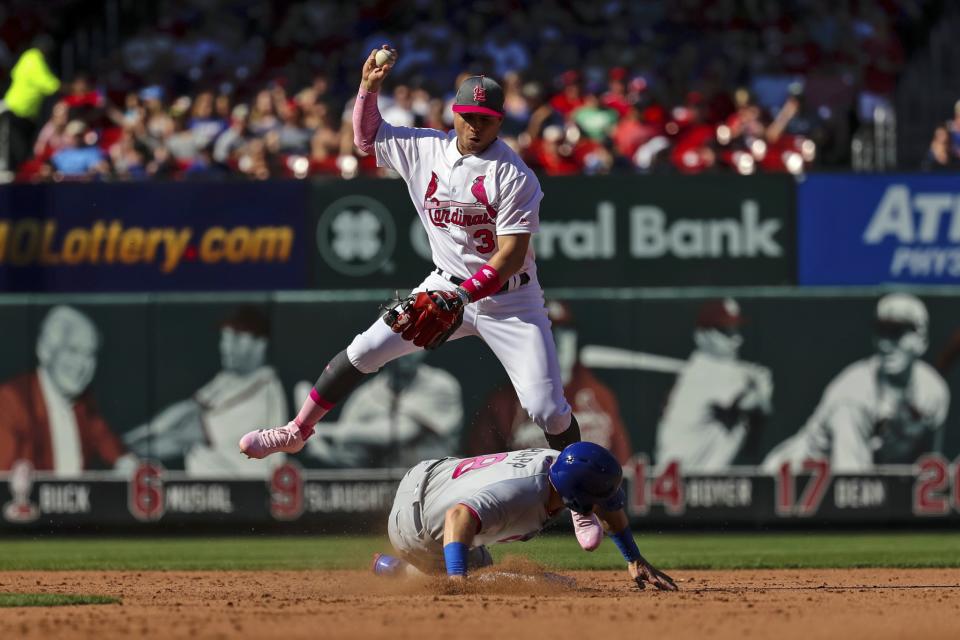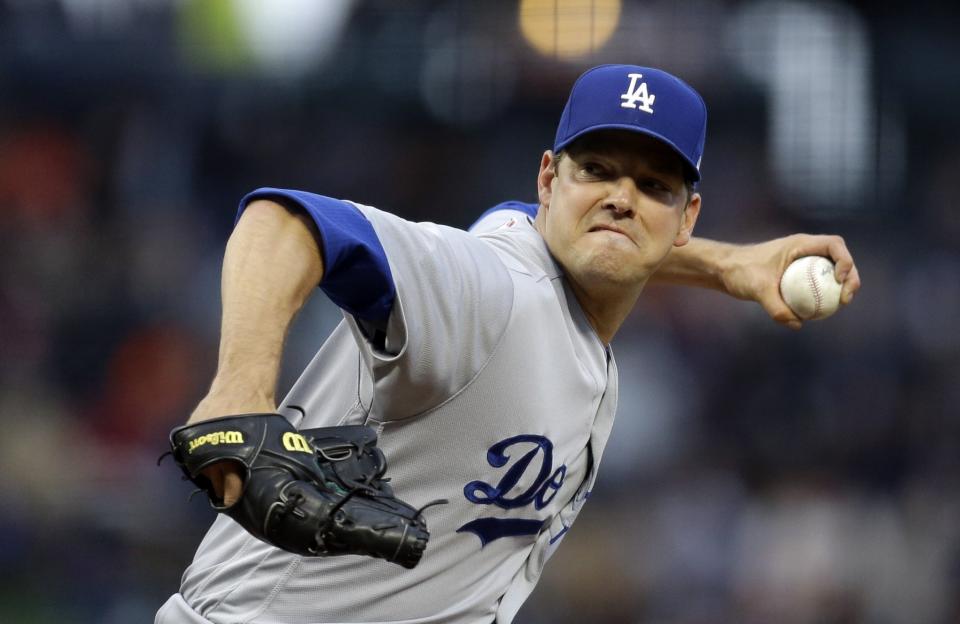Here's why MLB's slide rule is more than a 'office-created technicality'
Everyone is a tough guy until his season ends in mid-May, his knee filleted and fit with enough plates and screws to assemble a tree house.
Yeah, we’re all freakin’ Bravehearts, and then some dude arrives from first base with the sentimentality of a bolt pistol, at which point we drop the souvenir claymore, mop away the face paint and demand the league take action against the reckless, soulless donkey.
Like most things baseball related, the characterizations of gamesmanship and sportsmanship — competition and excessiveness — depend entirely upon who is doing the barrel rolling and who is doing the notifying of next of kin. Let’s just agree the truth almost always rests somewhere in between, largely ignored.
Which brings us again to second base and, to a certain degree, home plate. But mostly to second base.

As you probably heard, the Chicago Cubs were unhappy last weekend because one of their players — rookie Ian Happ — was deemed to have fallen short of the standard of honorable play near the second-base bag. Well, he over-slid the bag, which violated the letter of the rule if not the spirit of it, and cost the Cubs a run and the remainder of an inning and who knows what else, and you’ll be surprised to learn the Cubs’ manager was livid and the St. Louis Cardinals’ manager applauded the professionalism and courage of the umpire along with the league that employs him.
So.
Was Happ out of line? Nah. As disruptive slides at second base can go, particularly over the course of hardball history, it was pretty tame.
Was the umpire — Mike Everitt — correct in his call? He followed the rules. Would the Cardinals have turned the double play? No, probably not. Should that be part of the conversation? Yep.
Was there a money quote? Glad you asked.

Jon Lester to reporters at the scene: “These guys have turned double plays their entire lives. They know how to get the hell out of the way. … We’re out there playing with a bunch of pansies right now. I’m over this damn slide rule.”
Look, nobody likes to lose a game by, as Joe Maddon described it, some “office-created” technicality. But here we are. When was the last time a catcher was carried from the field, a victim of the flyin’, blindsidin’, shoulder-lowerin’ pneumatic bolt pistol? Remember the summer and fall of 2015, when middle infielders may as well have been stirrup-wearing clay pigeons. Remember the outrage. That’s what this is about.
You maybe can’t expect a manager or his players to ride the long view in the minutes after a loss. You certainly can’t expect every umpire to get every play correct, especially when opinion is laid over judgment. This is not to say Mike Everitt was wrong on the play, necessarily. Or that Joe Maddon and Jon Lester were wrong about the play, necessarily.
It is to say, however, that everybody walked away from the play, and if that’s the worst thing to have happened, well, all we can say about that is, “I know you can fight. But it’s our wits that make us men.”
It’s a quote from Braveheart.
***The 10-day disabled list has had a six-week run and the result is about what was expected – more players got hurt.
Weird, yeah.
First, let’s look at April over April.
In April 2016, 149 players spent time on the 15-day disabled list. The new CBA brought a 10-day disabled list. Last month, 177 players went there. Including all disabled-list placements, which adds the 60- and 7-day (concussion) categories, the totals were 173 in 2016 and 207 in 2017.
Further, through day 43 of this season, that being Monday, there were 232 total disabled-list placements. Through 43 days a year ago: 184. In 2015: 214. In 2014: 192. In 2013: 186.
Logically, under the 15-day arrangement, a team might have been more inclined to wait out a relatively minor injury, one that would require a week or so from which to recover. Under the new rules, the same injury might be DL worthy, if it cost the team two or three healthy days rather than six or seven.
MLB officials say there has been no change in the league’s usual medical oversight. League doctors review most, if not all, disabled list assignments in the same way as years past.

All that said, the Los Angeles Dodgers would appear to have been very unlucky over the first 43 games, having placed 16 players – some of those the same player twice, Rich Hill for one — on the new 10-day DL. Sixteen’s a lot. Eleven of those have been pitchers, six of the 11 being starting pitchers, though fortuitously many have returned precisely on the 11th day. Good livin’, man.
Disabled list, taxi squad, whatever you want to call it, maybe it reveals something about how a real taxi squad could work, and how it could work to lighten the strain on starting pitchers in particular, and how that could be a good development in the long run.
***WHAT ELSE
Former umpire Steve Palermo died Sunday. He was 67. He was a terrific umpire. After a bullet paralyzed him from the waist down, he became a terrific umpire supervisor. All of which was fine. Here’s what was great about Steve Palermo: He was among the kinder men I’d met in nearly three decades around the game. He’d inch along a hallway or a dugout on that damned cane. Some days surely were better than others over that thing. And indeed occasionally you’d come upon him leaning against a wall, by himself, resting, gathering himself, staring at his own shoes. He’d hear you coming, look up, and whatever had slowed him was gone in a smile and a how-you-doin’ and a where-you-been and a didja-see-that-play-last-night. He would not make his problem your problem. He would not make his pain yours. He was just a good guy, a guy I liked, my kind of guy, a guy I’ll miss.
***INCOMING
The Milwaukee Brewers are at Wrigley for the weekend, which is interesting because the Brewers are trying to be competitive in the NL Central and so are the Cubs.
In mid-May, the Brewers have scored the second-most runs in the National League, behind only the Washington Nationals, and have hit the most home runs. They arrive at a particularly interesting time for Jake Arrieta, who in his past five starts has allowed 40 hits, 26 runs (21 earned) and eight walks in 26 innings. Arrieta’s ERA in the five games is 7.27 and his batting average against is .357. You wouldn’t expect that sort of imprecision to last forever, but maybe it’s not such a great time to face the Brewers, either.
The probables:
Friday: Wily Peralta vs. Eddie Butler
Saturday: Chase Anderson vs. Arrieta
Sunday: Jimmy Nelson vs. John Lackey


